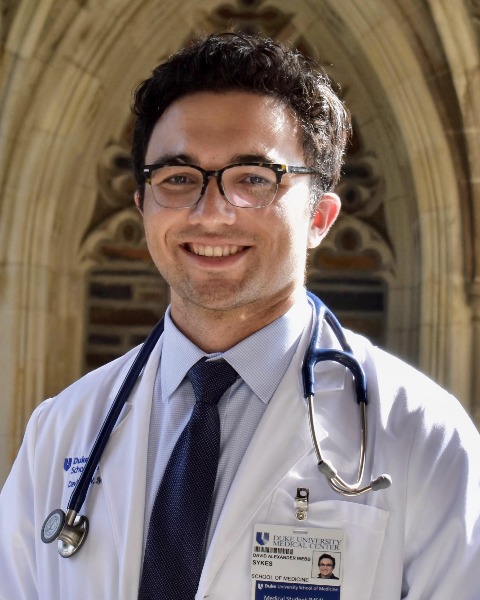
David A. Sykes, AB (he/him/his)
Medical Student
Duke University Department of Neurosurgery
My name is David Sykes, and I am a medical student at the Duke University School of Medicine (Class of 2024). I completed my undergraduate degree in biochemistry/molecular biology at Washington University in St. Louis. At WashU, I performed basic science research in bone biomechanics and metabolism. Specifically, I studied the role of osteoblasts in post-fracture angiogenesis and created a mouse model for fracture nonunion. I have published manuscripts on both of these subjects.
Following my undergraduate degree, I began my studies at the Duke University School of Medicine. At Duke, my clinical interests shifted from the realm of orthopedics to neurosurgery. Fundamentally, I seek to treat patients with disorders and dysfunction of the central nervous system with ultra-minimally invasive strategies. My fields of interest within neurosurgery, therefore, are spine surgery, endovascular neurosurgery, and endoscopic surgery.
While at Duke, my primary research focus has been studying the clinical outcomes associated with wide-awake spine surgery under spinal anesthesia. This work is done under the mentorship of Dr. Muhammad Abd-El-Barr. This work has been presented at national conferences and published in peer-reviewed journals. I am currently launching a prospective randomized trial on this subject which seeks to investigate CSF markers of inflammation in response to awake versus asleep surgery. This work has run in parallel to several projects studying the outcomes associated with ultra-minimally invasive, robot-assisted techniques and paraspinal anesthetic blocks.
While studying anesthesia’s role in neuroinflammation, I have also become involved with several large clinical trials run by Dr. Miles Berger, a neuro-anesthesiologist at Duke. My main focus with this group is to characterize CSF proteomics in ApoE4 carriers. What we have found is that complement proteins may be implicated in the pathogenesis of Alzheimer’s in ApoE4 carriers via complement-mediated synapse degradation by microglia, a process that is present in physiologic synaptic pruning during development.
I have also developed an interest in emerging technologies in neurosurgery. For instance, I am the primary medical-student representative on a multi-disciplinary team seeking to utilize machine learning to improve triage accuracy for spine surgery referrals in patients presenting with lower back pain. I am also the primary clinical representative on a neurosurgery/computer-engineering team that has created an augmented reality system for external ventricular drain placement. This system demonstrates greater accuracy than the industry standards and possesses novel contextual guides. This project was recently presented at an international conference for augmented and virtual reality experts and will soon become published for public viewership.
In my next phase of training, I hope to complete a residency in neurosurgery and plan to continue my research endeavors to reduce the “surgical footprint” associated with neurosurgical procedures with cutting-edge methods in surgical technique, neuro-anesthesia, and technology.
Poster(s):
-
Friday, April 21, 2023
